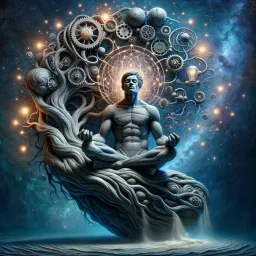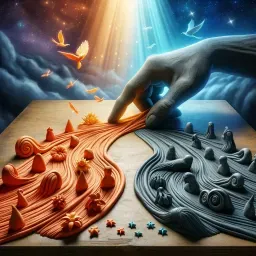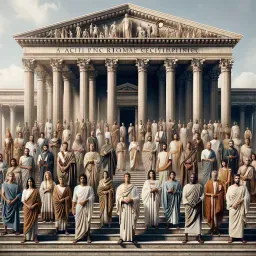We know what we are, but not what we may be

0
0
0
0
- Meaning
- The phrase "We know what we are, but not what we may be" encapsulates a profound reflection on human potential and the uncertainty of the future. It speaks to the intrinsic self-awareness that individuals possess about their current state or identity, juxtaposed with the unpredictable possibilities that the future holds. This statement from Ophelia may be interpreted as a commentary on the limitations of human foresight and the boundless potential that lies within the unknown future.
- Allegory
- The mirrored figure at the forest's edge represents our current understanding of ourselves, with the forest symbolizing familiarity and known experiences. The open field leading towards a luminous horizon encourages viewers to think beyond their current state, symbolizing untapped potential and the uncertainty of the future. This image captures the essence of Shakespeare's words by visually narrating the balance between self-knowledge and the unexplored avenues of what we may become.
- Applicability
- On a personal level, this phrase reminds us to be open to personal growth and transformation. It encourages an acceptance of the present while maintaining a hopeful and flexible outlook towards future possibilities. In daily life, this could manifest in being more adaptable and open to change, recognizing that while we might have a grasp on our current selves, our future selves can evolve in ways we may not currently imagine.
- Impact
- The phrase has had a significant impact on discussions about personal identity and growth. It is often cited in educational and psychological contexts to explore themes of self-awareness and personal development. Furthermore, the quote is used in motivational speeches and self-help materials to illustrate the potential for change and growth inherent in every individual.
- Historical Context
- The phrase was coined during the Elizabethan era, specifically entrenched within Shakespeare's literary work, which dates back to the late 16th and early 17th centuries. This was a time of immense cultural and intellectual growth in England, often called the English Renaissance. Shakespeare's writings often reflected on philosophical and existential themes inherent to human nature, which resonated deeply with audiences of his time and continue to do so today.
- Criticisms
- While the phrase is largely inspirational, it may also be criticized for its ambiguous nature, which leaves much to individual interpretation. Some might argue that it oversimplifies the complex nature of human identity and potential, potentially leading to unrealistic expectations about personal change and future possibilities.
- Variations
- While the phrase is primarily derived from Western literature, its universal theme of self-awareness and potential can resonate across various cultures, each bringing its own perspective and cultural nuances to the understanding of personal growth and future possibilities.
-

Alea iacta est
-

It is not in the stars to hold our destiny but in ourselves
-

Cogito, ergo sum.
-

This above all: to thine own self be true, and it must follow, as the night the day, thou canst not then be false to any man.
-

To be, or not to be, that is the question.
-

There is nothing either good or bad, but thinking makes it so.
-

Gens togata.
-

The fool doth think he is wise, but the wise man knows himself to be a fool.
-

I am not bound to please thee with my answers.
-

Hell is empty and all the devils are here.
-

I must be cruel, only to be kind.
-

Doubt thou the stars are fire; Doubt that the sun doth move; Doubt truth to be a liar; But never doubt I love.
No Comments